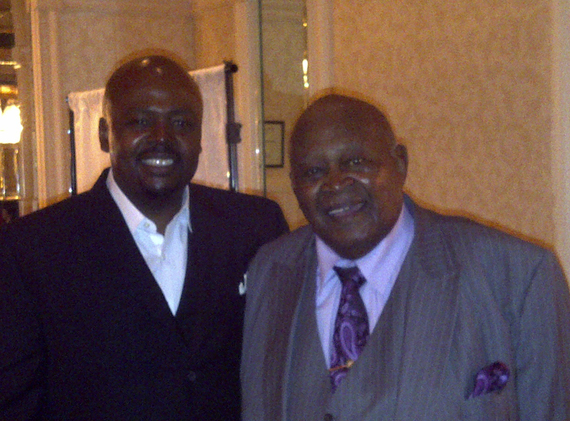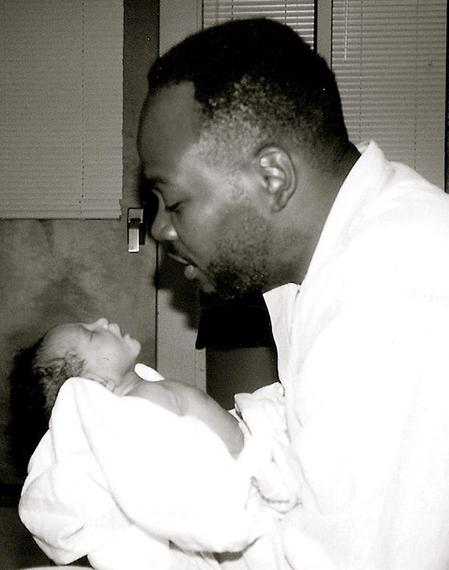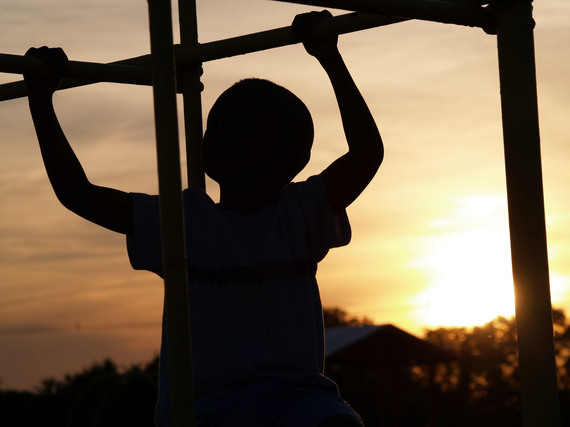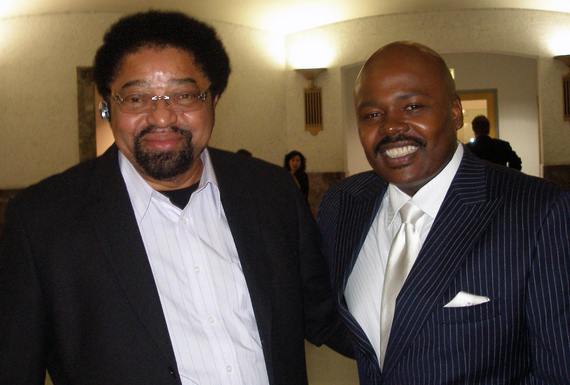By John W. Fountain
Driving into Evergreen was like driving through a cloud of smoke into the past. The roads looked strangely familiar, as the events of 1979 seemed to come back to life. There was the police station uptown where Mama, my stepfather, Net, and I had gone to get a copy of the police report.
Soon we rounded the corner on Highway 31 South, where my father had been shot like a missile through the windshield of his car when it was hit by the truck. We traveled north a piece until I spotted the narrow driveway where my father's car had rolled just a few feet onto the highway into harm's way before the awful wreck happened.
Then we drove up the driveway toward the little redbrick, single-story house where my father had spent stupefying his mind and soul, and where his mother, my grandmother, still lived. I knocked on the door and she emerged, a frail, thin woman with butterscotch skin and big glasses. I hugged her and we went inside and talked for a while.
"As my anger seeped from my pores, from my heart and soul,
I was also filled with sympathy and sorrow for my father..."
Our conversation was filled with questions, which rolled slowly and painfully from my lips. Questions about who my father was, about why my father never came to see me, and about my father and family's medical history, which in time had become more important for my own longevity and the well-being of my children.
"I don't know why he didn't come and see you," Mrs. Jackson said, speaking plain and honest. "We all knew about you and your sister. But you know Gwen," she said, referring to my mother. "That girl could be so mean."
I sat there thinking that she had some nerve saying anything about my mama. But I allowed her to continue uninterrupted.
"I don't know," she continued. "You know, your daddy had a drinking problem. I just could never get him to leave that stuff alone. He was okay as long as he didn't drink. But when he drank..."
I listened to Mrs. Jackson talk for a little while about how my father was forced to live with her mother because his stepfather did not want him living there with his siblings and mother. She spoke of some of her other sons or relatives who had drinking problems, about another relative who was killed in an automobile accident, about one whose legs, she said, were amputated because of drinking and diabetes, about one sad tragedy after another.
The more she talked, the more the anger and pain of a lifetime seemed to fall off me like dead dry skin. And I began to wonder what might have happened to me if my troubled father, so vexed by all of his demons that tormented not only him but also possessed his family, had been in my life. I knew how my life without him had turned out. And though less than perfect, I was not an alcoholic. I had a steady and respectable job. I had managed to go back to college and earn my degrees despite my hardship. I believed in family and loved my children, who would never know the pain of not knowing their father's love or suffer the image of me to be reduced to a shadow in a foggy mirror.
All that time I had thought myself to be deprived by not having known my natural father. But sitting therein the living room, where his mother's only picture of him hung in a an oval frame, for the first time in my life I understood that I was better for not having known him. I actually thanked God for my not having known the man and for having given me the good sense to latch onto the best that was in the men who were in my life. I was the sum total of them all.
From my grandfather, I took his love for God and family and his stewardship. From Uncle Gene, I took his humor and oomph for masculinity and manhood. From my stepfather, I took his kindness toward children, his love of the blues, and his knack for do-it-yourself fix-up jobs. From Mr. Adams, I took his zest for education and the belief that it had the power to change my life, his perseverance and indomitable back-the-freak-up presence as a black male. From some men who crossed my path, I took the fire that for me symbolizes black manhood. And from others, the gentle hand, tenderheartedness, and righteousness that is our eternal flame.
From my father, even in his absence, or perhaps because of it, what I took was the memory of a father walking hand in hand with a son, the smell of cinnamon gum (that often hung on his breath), and a pact I made with myself to be a better man than he was.
As my anger seeped from my pores, from my heart and soul, I was also filled with sympathy and sorrow for my father, whom I was beginning to see as a troubled boy who grew up to be a troubled man whose troubles eventually swallowed him whole.
Before we left Evergreen that next morning, there was one last stop to make on my journey. I needed to go by Long Corner Cemetery to see where my father was buried. Mrs. Jackson said that one of her sons would need to take my by the cemetery to help me find the grave, which was not marked by a headstone.
And so my father's brother, Billy, led me toward the gravesite, and after a while, narrowed my father's resting place to one of several nameless white slates covered by weeds and grass.
"I think it's this one," he said, looking puzzled. "But I can't say for sure."
I stood above the grave, teary-eyed. Then I squatted. Billy and my wife and son walked away so that I could make my peace.
I had not been able to cry at my father's funeral. But 16 years later, the tears began to pour. They flowed freely as I began to have that long-overdue conversation I had always dreamed of having with my father. Much of what I said at the grave site that day remains a blur, though I do recall telling him about the man I had become.
It was only those words that I found most liberating that I clearly remember saying. "I love you, Dad," I said, wiping away tears, "and I forgive you."
With that said, I climbed into my car and drove out of Long Corner Cemetery, away from Evergreen, away from death and back toward life.
Email: Author@johnwfountain.com
Website: http://www.johnwfountain.com

John Fountain with his paternal grandfather, The Reverend George A. Hagler, who he says was an influential male force in his life.



